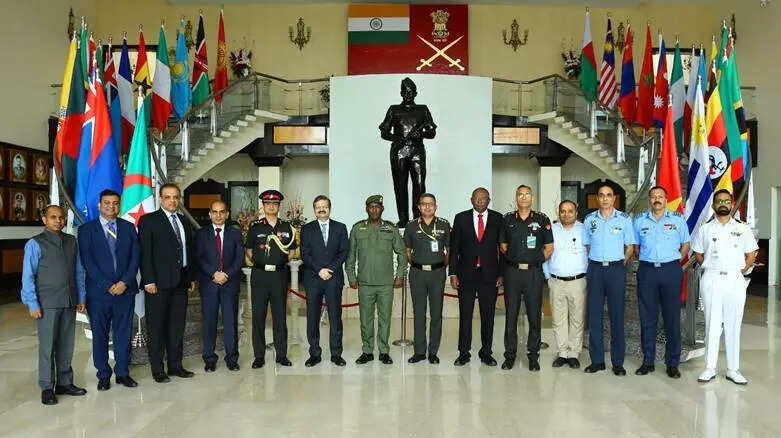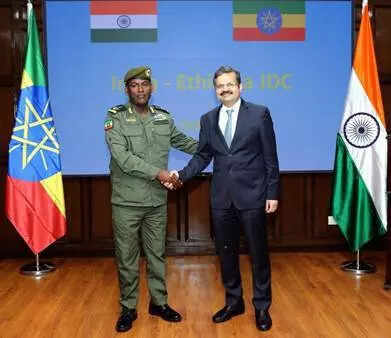
When India and Ethiopia convened their inaugural Joint Defence Cooperation (JDC) meeting in New Delhi on October 15, 2025, it was not merely a bureaucratic milestone—it was a historical echo. It symbolized the meeting of two ancient civilizations that had once traded across the Indian Ocean, now reuniting under the imperatives of a multipolar world.
As Joint Secretary (International Cooperation) Amitabh Prasad and Ethiopia’s Director General for Defence Foreign Relations Maj. Gen. Teshome Gemechu co-chaired the session, the agenda extended far beyond defence protocols—it sought to reimagine an Afro-Asian partnership grounded in shared security, mutual prosperity, and historical continuity.
The institutional mechanism established under the Defence Cooperation MoU signed earlier in 2025 between the two defence ministers has transformed the relationship from a development-centric association into a strategic dialogue.
In the words of India’s Defence Minister Rajnath Singh, “India’s partnership with Africa is guided by the principle of mutual respect and shared growth. We seek to empower our partners, not to impose our choices.” Ethiopian Defence Minister Aisha Mohammed responded in kind, affirming that the collaboration with India “embodies a partnership of equals built on trust, technology, and training.”
This convergence in the defence domain reflects a broader transformation in India–Ethiopia relations, which have deep economic, cultural, and historical roots spanning two millennia.
Ancient Maritime Ties and Post-Colonial Solidarity
The story of India and Ethiopia begins long before the age of modern diplomacy. The ports of Adulis and Bharuch, during the first millennium CE, connected the Aksumite Empire and the Indian subcontinent in a thriving network of maritime trade. Spices, silk, and ivory crossed the Red Sea and Indian Ocean, while ideas, beliefs, and communities moved with them. Coins from the Kushan Empire unearthed in northern Ethiopia and linguistic parallels in ancient trade records are enduring reminders of this early globalism.
In the modern era, both nations found themselves resisting imperial domination and later emerging as champions of decolonization. India’s first Prime Minister Jawaharlal Nehru often cited Ethiopia’s resistance to Italian aggression as “an emblem of human dignity in the face of oppression.” After independence, Emperor Haile Selassie and Nehru established a rapport rooted in shared visions of the Non-Aligned Movement. In 1950, the two countries established formal diplomatic relations, making Ethiopia one of India’s earliest partners in Africa.
For decades, India’s contributions to Ethiopian education and public administration were notable. Hundreds of Indian teachers and professionals worked in Ethiopian institutions, leaving behind a legacy of intellectual exchange and institutional building. As Ethiopia supported India in multilateral forums and endorsed its aspirations for a permanent seat on the UN Security Council, the relationship acquired a dimension of mutual diplomatic trust.
Contours of Contemporary Economic Engagement
Today, India is among Ethiopia’s largest trading and investment partners in Asia. Bilateral trade has undergone cyclical fluctuations but remains robust. According to data from India’s Ministry of Commerce, bilateral trade stood at around USD 642 million in 2022–23, with India ranking as Ethiopia’s second-largest exporter. India primarily exports pharmaceuticals, machinery, iron and steel, while Ethiopia’s exports include pulses, oilseeds, and gemstones.
In the investment landscape, India’s footprint is deep and diversified. Over 600 Indian companies are active in Ethiopia, particularly in textiles, agriculture, and manufacturing. The Indian cumulative investment commitment is estimated at over USD 5 billion, positioning India among Ethiopia’s top foreign investors.

As External Affairs Minister Dr. S. Jaishankar noted during the India–Africa Business Conclave, “Our development partnership with Africa rests on the pillars of capacity building, investment, and innovation. Ethiopia stands as one of the brightest examples of this engagement.”
India’s concessional Lines of Credit (LOCs), extended through the Exim Bank of India, have financed power, irrigation, and infrastructure projects in Ethiopia. The Pan-African e-Network, an Indian initiative linking hospitals and universities across Africa through satellite and fibre-optic connectivity, was among the early testaments to digital cooperation. Moreover, educational and technical scholarships under the ITEC programme continue to shape Ethiopia’s human resource development, producing a cadre of engineers, administrators, and scientists trained in India.
Despite these achievements, trade imbalances persist. Ethiopia’s narrow export base, combined with logistical challenges and currency convertibility issues, has hindered balanced growth. Recognizing this, both sides have agreed to explore local currency settlements and possible linkages between India’s Unified Payments Interface (UPI) and Ethiopia’s EthSwitch, to reduce dependency on dollar transactions and facilitate smoother trade flows.
Defence Cooperation: From Training Exchanges to Strategic Dialogue
The evolution of India–Ethiopia defence relations is perhaps the most striking development of 2025. Historically, India’s military cooperation with Ethiopia began as early as 1958, when Indian officers assisted in training Ethiopian armed forces. But the signing of the Defence Cooperation MoU in February 2025, during Aero India, inaugurated a new strategic phase.
The MoU envisioned collaboration in joint training, military medicine, cybersecurity, industrial production, and defence R&D. The subsequent JDC meeting in October 2025 in New Delhi provided an institutional backbone to these aspirations. Senior representatives from India’s Department of Defence, DRDO, and the three services held wide-ranging deliberations with Ethiopian counterparts on future cooperation.
India’s focus on defence partnerships with African nations aligns with its broader strategic outreach in the Indian Ocean and Horn of Africa. By engaging Ethiopia—a country with one of Africa’s largest and most experienced armed forces—India extends its strategic footprint into the western Indian Ocean corridor, reinforcing maritime security and counter-terrorism efforts.
For Ethiopia, whose forces have been active contributors to United Nations peacekeeping operations, Indian training and technology offer valuable synergies. As Maj. Gen. Teshome Gemechu observed, “India’s approach to defence partnership is grounded in shared learning and not in hierarchy. Our cooperation enhances regional stability and promotes the principle of African solutions to African challenges.”
This alignment of values—capacity building, peacekeeping, and respect for sovereignty—distinguishes India’s engagement from transactional models pursued by other external actors on the continent.
Intersecting Economics and Security: Toward a Comprehensive Partnership
India’s expanding presence in Ethiopia must be seen as part of a comprehensive Afro-Asian partnership, where economic connectivity and defence cooperation reinforce one another. Investments in Ethiopian infrastructure and manufacturing complement security collaboration by contributing to stability and employment. Meanwhile, defence cooperation offers Ethiopia access to Indian expertise in logistics, communications, and technology transfer—factors that indirectly boost its economic modernization.
Such complementarity is particularly crucial in the Horn of Africa, a region marked by both promise and volatility. India’s strategy of co-development and co-production, as articulated by Defence Minister Rajnath Singh during the India–Africa Defence Dialogue, aims to create a self-sustaining ecosystem of industrial cooperation rather than dependency. “India’s vision,” he stated, “is not to arm the world, but to empower it.”
This ethos resonates deeply in Addis Ababa, where Ethiopia’s own industrial transformation plan prioritizes technology transfer and local capacity building. The ongoing engagements also echo Prime Minister Narendra Modi’s call at the Voice of Global South Summit that “India’s development partnership is guided by demand, not by doctrine.”
Challenges and the Road Ahead
Despite the positive trajectory, structural challenges remain. Ethiopia’s economic strain following its debt restructuring and the impact of conflict in the Tigray region have constrained fiscal space for large-scale industrial or defence projects. Logistics inefficiencies and limited port access (given Ethiopia’s landlocked geography) raise transaction costs for trade. Moreover, competition from other major powers in Africa—particularly China and the Gulf countries—poses both opportunities and pressures for Addis Ababa’s foreign policy autonomy.
For India, sustaining meaningful engagement will require continuity in institutional mechanisms, dedicated funding, and private-sector partnerships that translate strategic intent into tangible outcomes. The upcoming rounds of the JDC and Joint Trade Committee (JTC) meetings are expected to focus on implementation timelines for defence training modules, industrial linkages, and digital financial integration.
Reclaiming the Spirit of the Indian Ocean
The India–Ethiopia partnership, grounded in antiquity yet animated by modernity, has entered a phase of pragmatic optimism. What began as an exchange of goods across the monsoon seas has evolved into an exchange of ideas, investments, and security frameworks. The convergence of economic and defence cooperation in 2025 marks a deliberate step toward institutionalizing South–South strategic collaboration in an era of multipolar uncertainty.
If sustained with consistency and mutual trust, the partnership between New Delhi and Addis Ababa could emerge as a model of equitable engagement—one where development, diplomacy, and defence are not separate pursuits but interconnected pillars of a shared destiny. As Ethiopia’s Foreign Minister Taye Atske Selassie aptly remarked during his last visit to India, “Our nations are bound by the winds of history and the horizons of hope. Together, we must sail once again across the same ocean that once united us.”
(Anoop Verma is Editor-News, ETGovernment)

